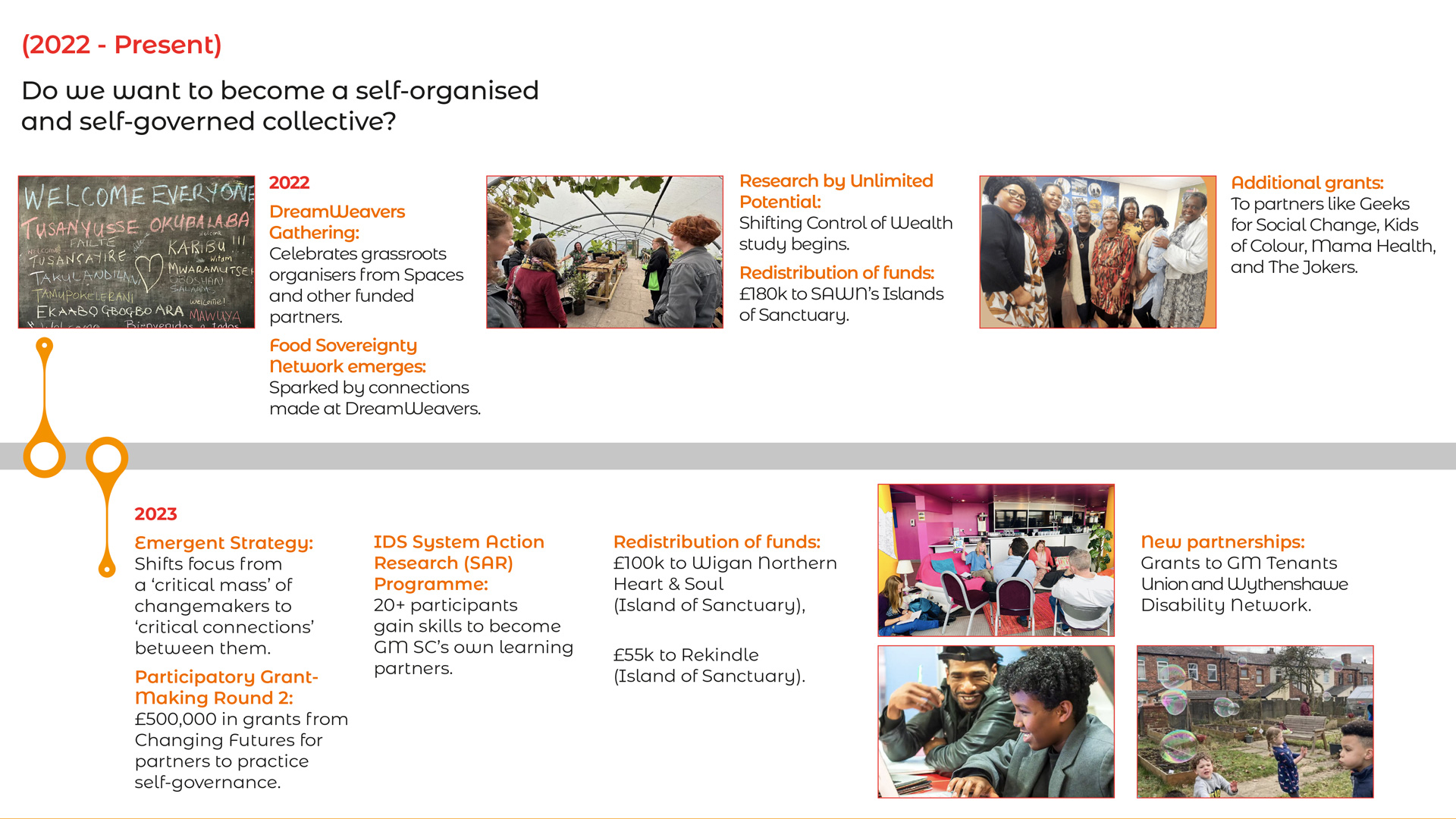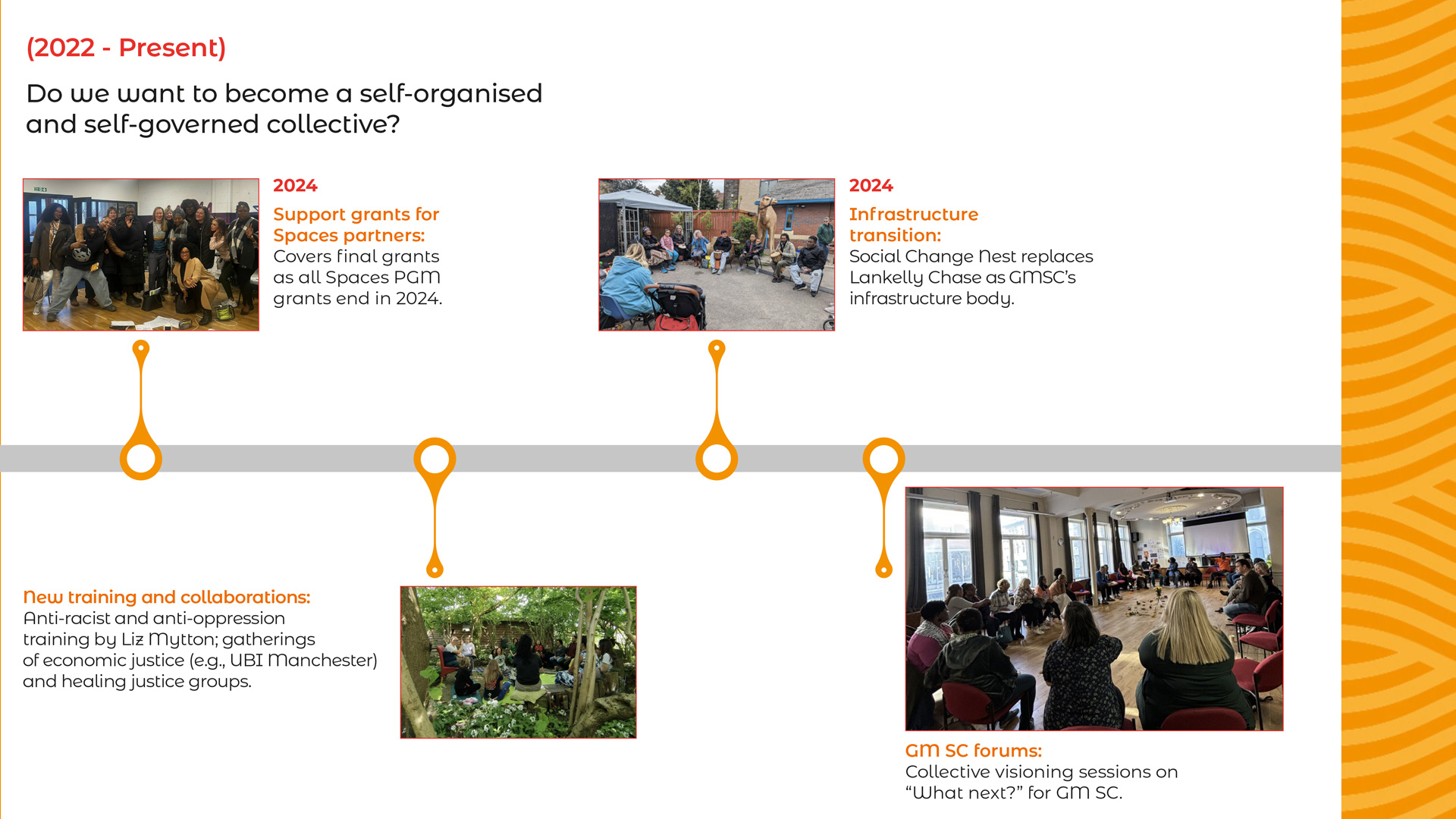

This blog post will be about how, by 2022, Greater Manchester Systems Changers (GM SC) evolved from its early stage supported by Lankelly Chase into a community-centred entity. If you haven’t read them yet, you can find part 1 and part 2 of our history on our blog.
Since 2020, the core team has been guided by the principles of participation, perspective, power, and justice over charity, along with a shared political analysis of being anti-colonial, anti-capitalist, anti-racist, anti-misogynist, anti-homophobic and anti-classist. From the start, they have seen their roles as temporary, bridging the transition for GM SC to become a self-organising, self-governed collective/network led and run by partners working towards Collective Liberation.
Now, in 2024, as partners and the core team consider GM SC’s future, we must listen deeply: is it what partners want? And if so, how do we get there?
The core team’s role: Tending to the health and connections between people in GM SC
The core team was committed to developing alternative models to the charitable industrial complex, which perpetuates ‘power over’ rather than ‘power with’ people. The mission has been to devolve power directly to those affected by systemic oppression, rather than becoming another grant-making body holding power and resources over marginalised grassroots communities. The belief is that for GM SC to embody justice, the structure needed to be led by partners., They should be the ones making decisions, and sustaining the network/collective, without outside oversight. This meant a serious commitment to the temporary nature of the core team’s role.
After an intense period creating a ‘critical mass of changemakers’ between 2020 and 2021, by 2022, the core team’s focus shifted to tend to the ‘critical connections’ between partners.
This shift felt important for three reasons.
- The core team was overstretching themselves, with no one working full-time on GM SC.
- Feedback from Spaces and the over 30 new partners highlighted the value of time and space for connections with others doing similar work.
- Financial resources were limited despite the overwhelming need, and the evidence that marginalised grassroots collectives and organisations are chronically, potentially intentionally, underfunded.
Prioritising the health of the existing GM SC ecosystem was the new priority, although there was also a little bit of room to bring in a few additional collectives who were organising in solidarity with working-class women and young people, predominantly of colours, towards Collective Liberation.
The new relationships that emerged, included Geeks for Social Change, who received a grant to support the development of PlaceCal, an online platform listing hyper-local events and activities on a street-by-street basis. Kids of Colour, a collective organising and campaigning on anti-racist youth work. Mama Health, a network organising to eradicate health inequalities for Black and African women and girls across Greater Manchester; and The Jokers, who worked with Katy Rubin to become trained facilitators of Legislative Theatre.
DreamWeavers Gathering: Celebrating the magic of the grassroots
The original plan of the Spaces programme included holding a celebratory gathering to witness the creative work that women and young people of the network were doing, but Covid-19 delayed this to June 2022.
DreamWeavers was a magical and joyful summer solstice event, where partners’ friends and family gathered, shared meals, danced, sang, drew, played, talked and rested together.
With Seasons of the Soul, everyone honoured the Earth, and held the profound grief often experienced in marginalised communities, especially for so many children who are in this country as refugees, asylum seekers or who have been forced to migrate. We collectively consented to rest as resistance and immersed ourselves in many ways of knowing and creative freedom.
On the last day, we attempted to dream of what a liberated Greater Manchester in 2050 might look like. In hindsight, like the Narratives Learning Lab, it might have been too soon for the ecosystem as it was the first time the whole community had a chance to gather. One exception was a workshop on food justice held by Rose Ssali from SAWN and Victoria Holden from Northern Lily. People were invited to pot plants together whilst dreaming and visualising through maps ‘what GM would look and feel like in 2050 if we all had access to growing our own food?’
Whilst Dreamweavers was, on the whole, a beautiful celebration, there were so many things that the core team could have done differently before, during and after, including good self-care. They had overextended themselves and had to rest and unexpectedly withdrew for many months after.
Developing the Emergent Strategy: Islands of Sanctuary and Organising Themes
After DreamWeavers, the core team held their annual sense-making session to reflect on learning from the past year and adapt their strategy
Inspired by Adrienne Marie Brown’s Emergent Strategy, they developed a framework to move beyond funding. The approach seeks to ‘deepen relationships, build trust, and political alignment’ and to think ‘beyond competition, binaries, and linear, short-term outcomes.’
They noticed a pattern across some partners’ work around specific social justice themes, such as healing, land, economy, and transformative governance and started from there to encourage cross-organisation collaboration.
This sparked initiatives like the Food Sovereignty Network led by Victorian Holdren, via a grant from GM SC distributed via Social Change Nest. In Victoria’s words, the Food Sovereignty Network is ‘about building robust infrastructure and fostering deep, relational connections among various groups and collectives across GM. By doing so, we are creating a resilient community that can thrive independently of the economic systems that often perpetuate food insecurity.’
Similarly, Economic Justice is another organising theme bringing cross-organisational collaborations, with core grants distributed to the UBI Lab Manchester. NEF in partnership with Mama Health, Middleton Co-operating, Our Agency and Wigan Northern Heart & Soul also received a grant to explore what a Universal Living Income might look like, and Unlimited Potential received a grant to explore how and what might be needed across GM to Shift Control of Wealth into communities.
Several partners, including Rekindle, SAWN, Wigan Northern Heart and Soul, and Middleton Co-operating became known as ‘Islands of Sanctuary’. They are organisations and collectives who are experimenting with neighbourhood transformation and community wealth building, interweaving themes of housing justice, food sovereignty and radical governance to build self-organising intergenerational and democratic neighbourhoods.
That same year, Changing Futures approached the core team, wanting to replicate the Space’s PGM work. Despite initial concerns from the core team about not wanting to become another grant-maker, GM SC partners saw it as an excellent opportunity to experience and practise self-organising and self-governing. With £500,000 of funding, 20+ partners managed every aspect of PGM, distributing grants to over 30 groups and influencing initiatives like the NHS Live Well programme.
Additionally, GM SC launched an 18-month Systemic Action Research programme with the Institute of Development Studies (IDS) to train a group from across GM SC how to become our own learning ‘experts’ in individual organisations, for a collective, or across a community like GM SC.
Preparing for a self-governed future: dissolving and expanding the core team
The Emergent Strategy renewed GM SC’s ambition to devolve power from the core team and distribute decision-making more widely. This transition was accelerated by Lankelly Chase’s decision to cease operations as a philanthropic organisation.
In 2023, the team began preparing for this shift. The budget was transferred to Social Change Nest, following positive outcomes with the Food Sovereignty Network. By late 2023/early 2024, 18 people, mostly existing partners, were invited to step into new roles as Temporary Stewards, reflecting GM SC’s commitment to shared leadership. While onboarding they have also been in a process of ‘Learning into Liberation’, they eased into their task: connecting with partners to ask them their dreams for the future of GM SC.
Initially, each Temporary Steward was invited to focus on gathering feedback from partners tied to a specific organising theme. However, this approach revealed challenging as some stewards struggled to fully understand their roles, and for some, their accountability to partners. This highlighted the need to move away from siloed approaches to a more collective one.
To address this, the team changed their strategy and collectively planned and delivered the GM SC Forums. These forums provided a space for partners to share their dreams for the future of GM SC. Insights from these forums will now inform a sense-making phase of the data from the forums, followed by, in early 2025, collective decision-making from all the partners about the future of GM SC.
This process is bringing to light all the complexity and messiness of trying to work as a collective without recreating the harmful dynamics of white supremacy and academia as the only viable source of knowledge, but, as a staff team, we are committed to holding it in the spirit of ‘power with’, listening to multiple perspectives, and encouraging participation.
Right now, we are curiously reflecting on these questions:
- Can GM SC truly become a self-organising, self-governed network when grant-making and funding are central to our history?
- How do we built trust with each other when we exist in systems designed to foster mistrust, extraction and competition?
- What accountability mechanisms do we need to put in place so we can call each other in and out with rigour, tenderness and grace?
- How can we really practice solidarity with each other?
- How can we trust to let go when the systems we exist taught us to fear messiness and uncertainty rather than embrace them?
Reflections and questions for the future
From the start, GM SC’s mission has always been to explore whether a self-organising, self-governing network working towards Collective Liberation could be created in Greater Manchester.
Throughout the years, this has guided the work, even amid the messiness and complexity of the process. The team has always emphasised the temporary nature of their roles and that GM SC should not become another charitable grant-maker, because justice, not charity, is one of our guiding principles, alongside solidarity with working-class women and young people, predominantly of colour, and collective liberation.
Yet, was this mission and strategy explicit enough? At times, even the core team and temporary stewards lost sight of it in the day-to-day challenges. Consistent communication with partners and allies, via blog posts, newsletters and social media, also only began recently. Despite this, GM SC has now grown into an ecosystem of over 60 organisations and collectives, all committed to justice and liberation.
Now, GM SC transitions into the next phase, focusing on making sense of the partners’ answers in the forums and via the form. Then, in March 2025, we will turn back to partners and ask them to decide, collectively, what they want for the future of GM SC, with the central question remaining: Do partners want to, and can we, transition into a self-organisation and self-governed network?
While partners will hopefully determine the answer in the next few months, the soil has been prepared for a future rooted in justice, solidarity, and collective liberation in Greater Manchester.
